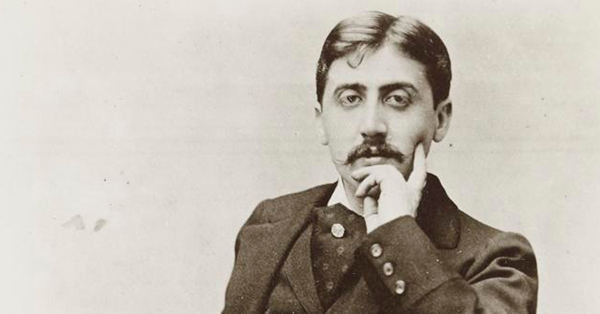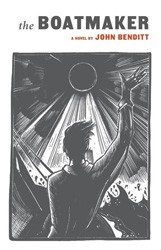
Earlier this week, John Benditt wrote about identity and writing. The Boatmaker is his debut novel. He will blogging here all week for Jewish Book Council’s Visiting Scribe series.
 Marcel Proust (photo by Otto Wegener)[Public domain], via Wikimedia Commons
Marcel Proust (photo by Otto Wegener)[Public domain], via Wikimedia CommonsWas Paul Newman Jewish? It seemed hard to believe. That jawline! The infinitely blue eyes! But my mother said he was. And I believed everything my mother said. There was a kind of complicity between us — as long as I believed in her. She pointed them out. “He’s Jewish.” Arthur Miller. (But not Marilyn Monroe.) “She’s Jewish.” Lauren Bacall. (But not Humphrey Bogart.) There was a way of reading the world that made sense of what was hidden behind the great screen that separates us from the infinite. My mother taught me how to read. Then I took a step away from my family and from what might have been a safe distance I began to look at things a different way. Was Proust Jewish? The answer seemed to depend on who was giving it. There was no question about some of the facts. His mother was born a Jew, which makes him, by law and custom, a Jew. She married a Christian. Their son, Marcel, was drawn to boys rather than girls at a time when homosexuality was illegal in most European countries, punishable by long prison sentences. Yet in his great book of memory he seems more comfortable being what was then called an “invert” than being a Jew. Being an invert seems to confer a depth of feeling, membership in an aristocracy of the senses, an elite of feeling; being Jewish does not. It may even do the opposite. But the Dreyfus Affair hovers over everything. It forces people to take sides. It shows them in a new light. Some of the aristocrats Marcel loves so much now seem different. What he has loved is their tradition, the depth of it, how every gesture, no matter how small, is underlain by centuries of confidence in their taste, in their ownership of the right thing — the right house, the right painting, the right horse. He is a man in love with a tradition that is not entirely his own and will never be entirely his own. So as I left my home, the one where I had partially grown up, I carried with me the way of reading my mother had passed on to me in secret. Behind the movie-star punim, Paul Newman was a Jew. (Though Joanne Woodward was not.) But this way of reading had changed as I carried it with me in its invisible ark. Now I was interested in those I thought of as “Unlikely Jews,” the ones who couldn’t be categorized, who seemed to slip away like eels from any net that was put out for them. The ones for whom Jewishness was no longer something clear and simple, if hidden from the eyes of those who could not read, but had become ghostly, hanging over everything without being embodied, like one of Marcel’s memories: present only when evoked by some sudden movement of the senses.
John Benditt had a distinguished career as a science journalist. He was an editor at Scientific American and at Science before serving as editor in chief of Technology Review. Read more about him and his work here.
Related Content:
- Six Degrees of Kevin’s Bacon: Who’s Jewish in Hollywood? by Emily Stone
- In Search of Lost Time by Miranda Richmond Mouillot
- Essays: On Writing Jewish Literature and Being a Jewish Writer
John Benditt began as a poet. He studied with Adrienne Rich at Swarthmore College and was awarded the John Russell Hayes Poetry Prize by Robert Creeley. He went on to have a distinguished career as a science journalist. He was an editor at Scientific American and Science and served as Editor in Chief of Technology Review, published by MIT. The Boatmaker is his first novel.



